Local Heroes serve through their religious communities
by Matt Ehrhorn
Philanthropy—the selfless act of giving back to one's community, whether through food or money donations, serving with a nonprofit organization, or simply working the soup kitchen at a downtown homeless shelter—has always been particularly relevant at this time of year. Our charitable inclinations toward those less fortunate tend to be stronger with the spirit of the approaching holidays in our hearts. Unfortunately, many of us tend to feel these inclinations less and less as the new year wears on and the generous and giving spirit of the holidays fades.
There are many people, however, who have adopted the philanthropic lifestyle as a way of life—people who, not just once a year but day after day, reach out and work to improve the lives of their fellow man and woman.
The religious community has always made up a significant portion of our altruistic society. Preachers, teachers, sisters and brothers of a shared faith—these people have always been in the service of helping others. The six local heroes profiled on the following pages may come from different religious backgrounds, but they all share a commitment to improving our community by improving the well-being and state of mind of those less fortunate who inhabit it. From small and local shelters to large and world-wide denominations, these men and women have made a life pledge to themselves and God to make a difference in the lives of others.
Presiding Bishop Norm Swails
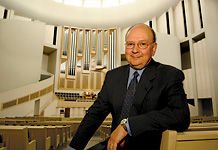
“The only way to be truly happy is to devote yourself to causes greater than you are.” Retired Bishop Norm Swails has been devoted to such community-based causes all his life. He served as national assistant chief scout executive for the Boy Scouts of America for 31 years before being called to Independence, Missouri in 1985 to serve as Presiding Bishop of the Community of Christ World Church headquarters.
“I feel it was a divine thing that I was allowed to be a part of,” says Swails, referring to how it felt twenty years ago to come out to Independence and help pull together endowment funds totaling $75 million for the then-named RLDS Temple. Bishop Swails credits the team involvement and contributions of the community and church members for its growth. Today, Community of Christ churches have approximately 250,000 members worldwide.
Before his successful career with the Boy Scouts, Bishop Swails was a trustee with American Humanics, a national nonprofit organization started by H. Roe Bartle in 1948 to train students for professional careers in youth and human service agencies. Headquartered in Kansas City, there are currently 80 such programs across the country.
In 1994, Bishop Swails helped found and served for two years as chairman of the board for the Truman Heartland Community Foundation, which serves 16 area communities and has generated up to $20 million in funds in its ten-year existence. He has also served as advisor for the Greater Kansas City Community Foundation and as president of the Legacy Foundation to restore blighted areas in Independence.
Considering all the service projects and organizations, past and present, that Bishop Swails has been involved with, he remains humble about his work and thankful for the encouragements of his wife Darleen and the involvement and cooperation of strong communities in all of his work. “Being in the service of others is being in the service of God,” he says, and an overview of Bishop Swails' careers and past and present community involvements shows that he has been in such service all his life.
Rev. Glenn R. Mosley, Ph.D.
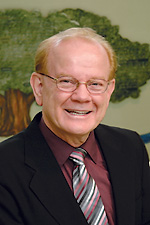
Unity is a word to which Rev. Glenn R. Mosley has devoted his life. Unity of faiths and unity of mission have guided much of his actions since taking over as president and CEO of the Association of Unity Churches International in 1985. In his own words, “All people are inherently divine expressions of the one God,” regardless of religion. In recent years, the Association has seen a significant increase in international churches, growing from 440 ministries in 1985 to 1,020 in 2000, with 175 of those located outside of the United States and Canada.
To assist this growth, Rev. Mosley has traveled all over the globe—covering 58 countries and all 50 states in the U.S.—to serve with committees such as the advisory council on the Association for Global New Thought and as a presenting organizer at the 2004 Parliament of the World's Religions in Barcelona, Spain. This last conference, which drew over 8,000 people representing 90 countries and approximately 500 religions, was chiefly planned to teach and encourage people of faith to go back to their homes and “take action,” or “bring peace and harmony to their communities,” whether by working for clean water in poorer countries, helping to relieve emerging nations of debt, or setting up schools.
The constant traveling, ovewhelming as it is, is a necessary challenge that provides its own reward. As Rev. Mosley puts it, he is “helping to create a fully international organization and empowering people to do what they never thought possible.”
Serving with Unity ministries all over the country since 1961, Rev. Mosley would like to take and run a single church with his wife, fellow Rev. Martha Mosley, after his resignation with the Association goes into effect in June 2005. Uncertain where this endeavor might take him, Rev. Mosley is sure of one thing: wherever he goes, he will bring with him his belief in unity and his devotion to missions work—in his own words, the “star by which I and our organization steers its life.”
Rabbi Amy Wallk Katz, Ph.D.

Being a rabbi who chose not to serve a congregation has given Rabbi Amy Wallk Katz a unique perspective on the Kansas City Jewish community. Ordained in 1992, Rabbi Katz moved to Kansas City nine years ago and wasn't sure how she would contribute to the local Jewish community. Since then, Rabbi Katz has served as president of the Rabbinical Association of Greater Kansas City and currently serves as director of the thriving Department of Adult Jewish Learning at the Jewish Community Center in Overland Park.
Over the last fifteen years, the Kansas City area—along with the rest of the country—has seen a tremendous growth in adult education. According to Rabbi Katz, until the 1990s Jewish education was not “considered an adult activity.” In 1990 she never would have predicted that this community would spend a quarter of a million dollars annually on the Department of Adult Jewish Learning and that approximately 350 adults would be enrolling in the many classes offered by the department.
The driving force behind Rabbi Katz's desire to continue improving adult education and increasing community understanding across faiths is her core devotion to her own Jewish faith. “I needed to be in Judaism and with people,” she says, “and I knew I could make the most impact on the Jewish community through education.” Recognizing that many Jews feel a sense of alienation from their religion, Rabbi Katz impresses upon her students that “it's not too late to start living a life infused by Jewish principles.”
Balancing this commitment with her commitment to raising her three children with her husband Ken, Rabbi Katz feels a sense of accomplishment when one of her students will occasionally come up to her after class and say, “'I'm practicing my Judaism now because of you.' When that happens,” Rabbi Katz says, “I'm elated.”
Pastor Emeritus Charles J. Briscoe
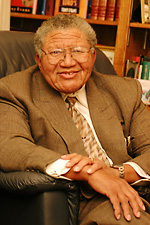
On June 10, Pastor Emeritus Charles J. Briscoe was honored by the National Center for Fathering with the 2004 “City Father” award. Offered to recipients who demonstrate community and family leadership and influence, the award was a fitting testament to the father of nine children and a man who has served Kansas City in various capacities for over 50 years.
Rev. Briscoe, a native Kansas Citian, has been involved with community services most of his life, including Goodwill Industries, the Kansas City Neighborhood Alliance, and the Young Men’s Christian Association. From 1970 to 1974, he worked as president and then chairman on the Kansas City, Missouri school board. “This was shortly after Martin Luther King was assassinated,” he says of the experience, “and so there was a lot of turmoil here in Kansas City.” He remembers letting students vent their frustrations, rather than “giving it back to them. It helped diffuse some of the volatile situations.”
Retired since February 2003, Rev. Briscoe was senior pastor at Paseo Baptist Church for 35 years. He has made mission trips with the church all over the world, including Africa, Israel, and Jamaica. Last year, Rev. Briscoe was on a work and witness trip in South Africa, where he, his wife Georgia Mae, and six other Paseo Baptist members helped start up their sister church in Johannesburg and conducted Vacation Bible school for area youths.
Rev. Briscoe is still involved with Paseo Baptist and serves on the board of directors for the Salvation Army and as secretary for the Carver Foreign Missions Board. This year, he was appointed co-chair of the Billy Graham Evangelical Association’s 2004 Heart of America Campaign, which came through Kansas City in early October.
Rev. Briscoe’s biggest concern has always been with building strong families within the church and the community. One of his greatest joys is “building bridges of understanding between various peoples” and helping families become “wholesome influences to this community.”
Rev. J. Earl Cavanaugh
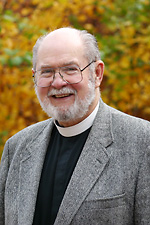
At Grace & Holy Trinity Cathedral’s 1976 Bicentennial, the congregation gathered outside and planted a tree as a symbolic gesture of breaking new ground and creating a place of invitation and sharing for all people in the community. The Very Rev. J. Earl Cavanaugh, who had accepted his position that year as dean and rector of the cathedral, was there for the ceremony. Throughout his twenty years of service with the church, and as the Episcopal Diocese of West Missouri, he has held close to this symbol of community regeneration.
Serving in the ministry for close to fifty years, Rev. Cavanaugh and his wife, Nancy Gingrich Cavanaugh, came to Kansas City from California in 1976 and were fortunate to witness the growth of the downtown community over the years. He refers to the climate in Kansas City as one of reconciliation, saying, “There is a great need to know the kind of grace and reconciliation that God offers. To have people downtown is just a Godsend. For all the problems in Kansas City, these are real exciting, move-ahead times.”
Rev. Cavanaugh has played an active role in several community service projects since the '70s. He has served on the boards of the Kansas City Homeless Task Force and Trust Fund, the Downtown Council for the AIDS Awareness Task Force, and is still a board member with Bishop Spencer Place, a full-range retirement community. In 1995, Rev Cavanaugh and the Grace & Holy Trinity congregation collaborated with Catholic Cathedral of the Immaculate Conception, Grand Avenue Temple, United Methodist, and St. Mary’s Episcopal Church to form Downtown Ministries, a Community Outreach program to clothe, feed, and offer shelter for the poor and homeless. Still strong today, the weekday lunch program the churches set up feeds, on average, over 350 people a day.
Although retired since 1995, Rev. Cavanaugh is still active with community projects and leads about five services a month as pastoral adjunct at Grace & Holy Trinity. “The strange thing about the ministry,” he says, “—you can retire from your job, but you never give up your vocation.”
Sister Ann McGuire, SCL
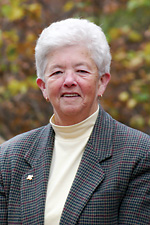
Sister Ann McGuire knows her job goes beyond simply curing sick people. “We treat the whole problem,” she says. “We let [our patients] know [they’re] not just a diagnosis to us.”
Starting her fourteenth year as executive director of the Caritas Clinic, Sister McGuire has made helping the poor, homeless, and uninsured her life mission. Caritas (which means “charity” and “love”) oversees the Duchesne Clinic in Wyandotte County, which recently completed a $1.2 million in renovations, and St. Vincent in Leavenworth, which was completed in early October with $550,000 raised by the Sisters of Charity of Leavenworth. As Sister McGuire aptly puts it, “We literally have created an environment of healing.”
Along with her duties at Caritas, Sister McGuire is a member of the Kansas Association of the Medically Underserved, the Kansas City, Kansas Mayor’s Commission on Healthcare, the Providence Health board of directors, and the Wyandotte County Safety Net Coalition, which received $1 million in federal grants last year and $800,000 this year to increase the capacity for healthcare management. The focus of each of these committees is to raise money for healthcare for the uninsured poor. To this end, Sister McGuire meets weekly with elected officials, foun-dations, churches, community boards, and other groups. “We give people the opportunity to share their ministry through financial donations.” She also owes much dependence on God’s providence, believing that, “If we’re supposed to be doing what we’re doing, the means will come.”
Beyond medical and dental services, one essential service provided by staff members at the clinics is assisting patients with the psychological trauma of being uninsured. To be able to not just help patients obtain healthcare, but to also see their changed reactions once they get back on their feet and start to feel better about their lives and themselves is one of the greatest pleasures of Sister McGuire’s job. “I believe we are called by a gospel mandate to serve our brothers and sisters,” Sister McGuire says. “If we truly believe we are made in the image and likeness of God, then when we serve the poor, we are truly seeing the face of Christ.”
